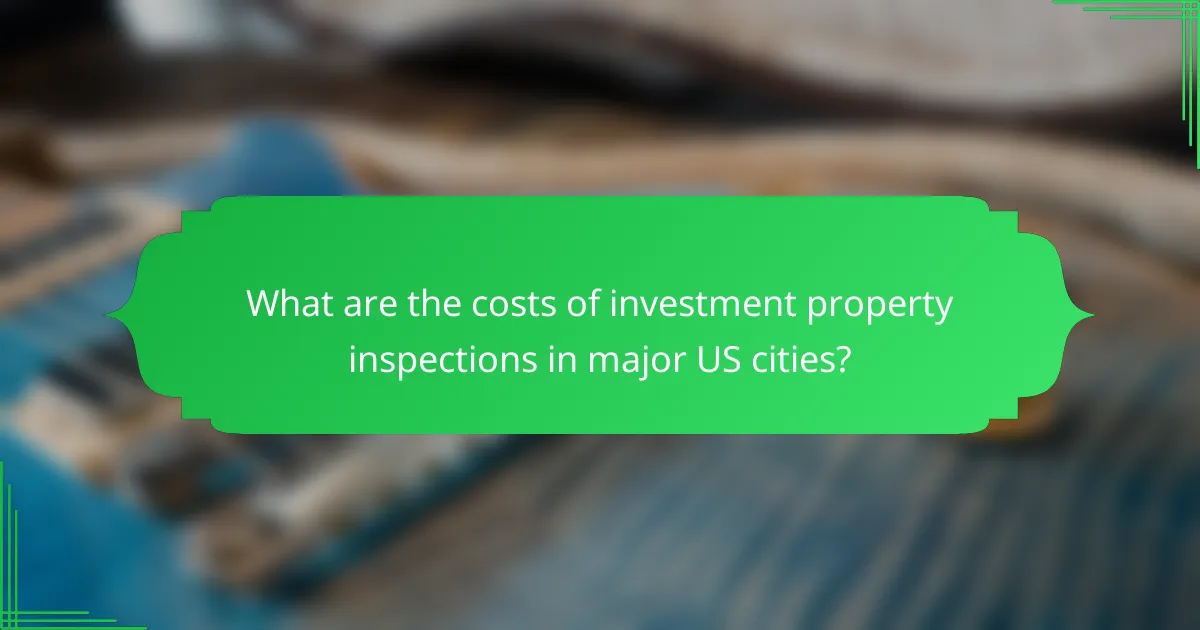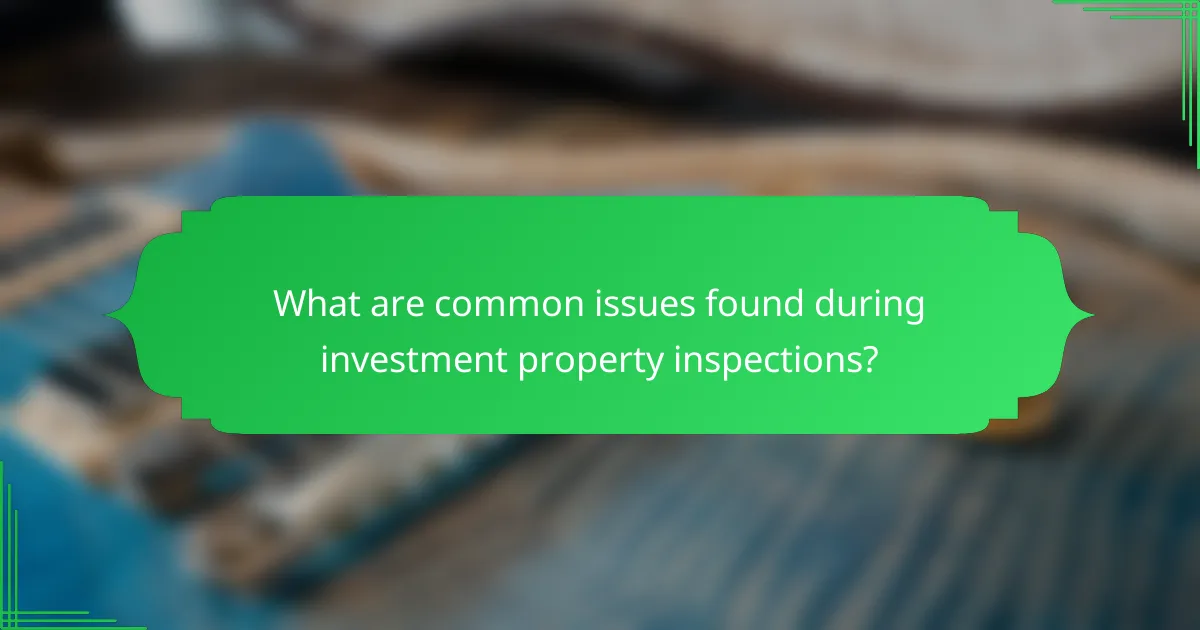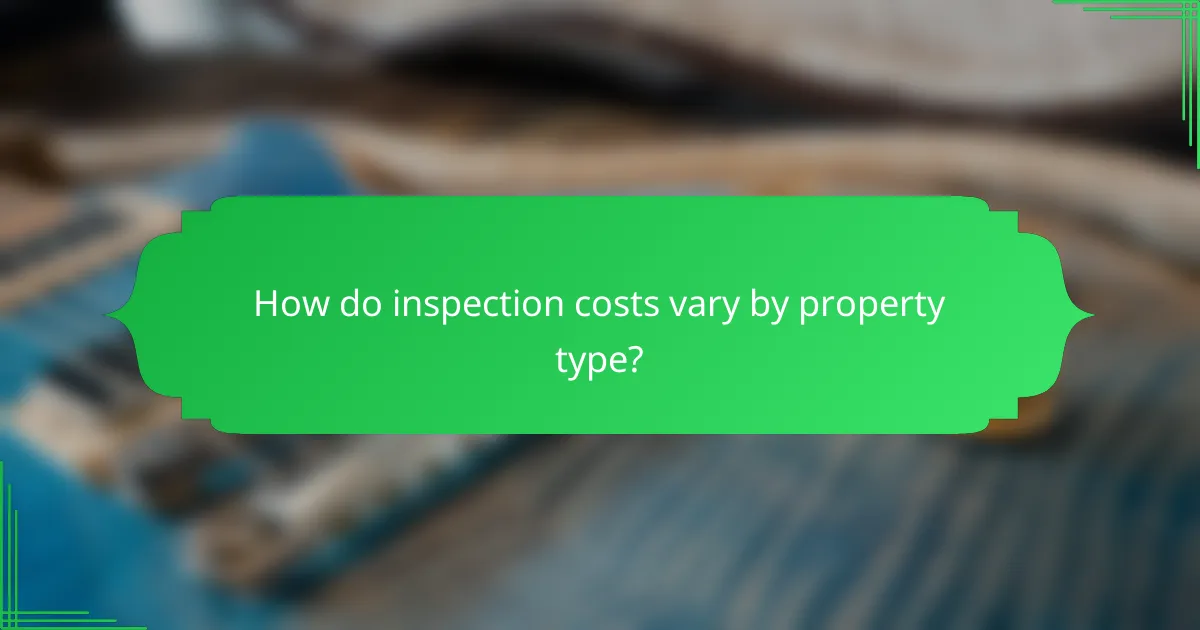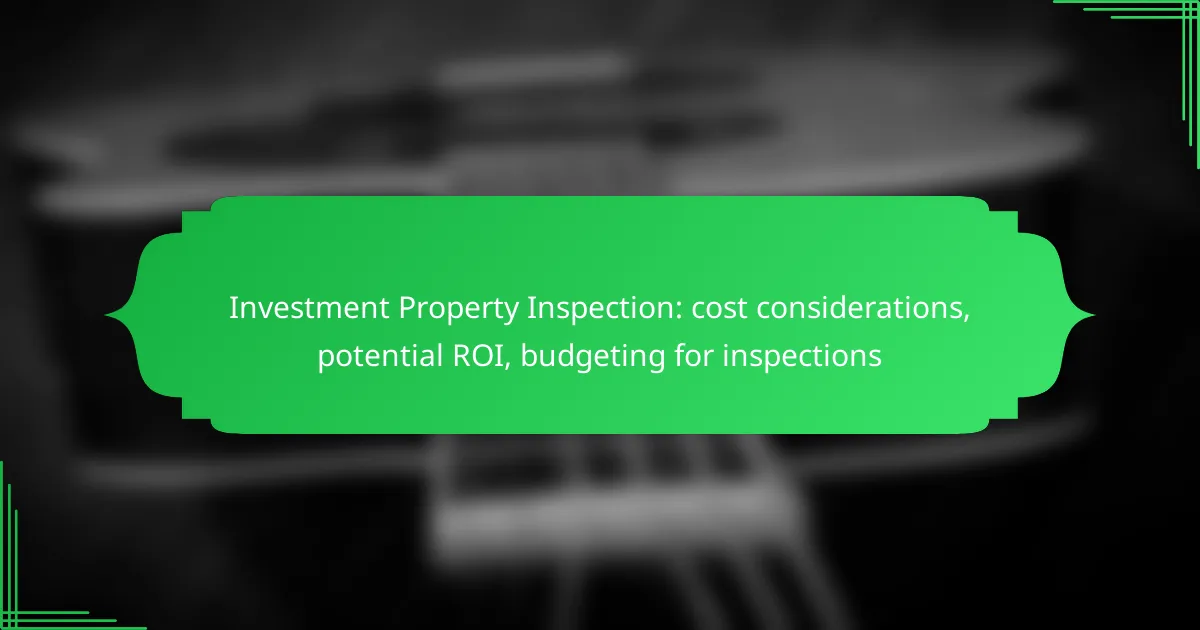Investment property inspections are a crucial step in safeguarding your financial interests, with costs varying widely based on factors such as size, age, and location. Proper budgeting for these inspections not only helps in estimating expenses but also maximizes potential returns by identifying issues early, ultimately protecting your investment and enhancing profitability.

What are the costs of investment property inspections in major US cities?
The costs of investment property inspections can vary significantly across major US cities, typically ranging from a few hundred to over a thousand dollars. Factors influencing these costs include the property’s size, age, and location, as well as the specific services included in the inspection.
Average inspection costs in New York
In New York City, the average cost for a property inspection generally falls between $300 and $600. Larger properties or those requiring specialized inspections, such as for mold or pests, can push costs higher, sometimes exceeding $1,000.
When budgeting for inspections in New York, consider additional fees for follow-up inspections or reports, which may not be included in the initial quote. It’s advisable to obtain multiple quotes from licensed inspectors to ensure competitive pricing.
Average inspection costs in Los Angeles
Los Angeles typically sees inspection costs ranging from $350 to $700, depending on the property’s specifics. Factors such as the property’s square footage and the complexity of the inspection can influence the final price.
Homebuyers and investors should also factor in potential extra costs for specialized inspections, like those for seismic safety or termite damage, which are common in the area. Getting recommendations from local real estate professionals can help in selecting a reputable inspector.
Average inspection costs in Chicago
In Chicago, the average cost for an investment property inspection usually ranges from $300 to $500. Similar to other cities, larger homes or those with unique features may incur higher fees.
It’s wise to check if the inspection includes a detailed report and any necessary follow-up visits, as these can add to the overall expense. Investors should prioritize hiring certified inspectors familiar with local building codes to ensure thorough evaluations.

How can I budget for investment property inspections?
Budgeting for investment property inspections involves estimating costs, understanding potential returns, and planning for various inspection types. A well-structured budget ensures you allocate sufficient funds for thorough evaluations, which can ultimately protect your investment and enhance profitability.
Creating a detailed inspection budget
To create a detailed inspection budget, start by identifying the types of inspections needed, such as general property, pest, or environmental assessments. Allocate funds for each type based on local market rates, which can vary significantly. For instance, a general inspection might range from $300 to $500, while specialized inspections could cost more.
Next, consider additional costs such as travel fees, follow-up inspections, or repairs identified during the initial assessment. It’s wise to set aside a contingency fund, typically around 10-15% of your total inspection budget, to cover unexpected expenses that may arise.
Factors influencing inspection costs
The complexity of the inspection also matters. For example, properties with unique features or potential hazards may necessitate specialized inspectors, which can increase costs. Always compare quotes from multiple inspectors to ensure you are getting a fair price while considering their qualifications and experience.

What is the potential ROI of investment property inspections?
The potential return on investment (ROI) of investment property inspections can be significant, as they help identify issues before they escalate into costly repairs. By ensuring properties are in good condition, owners can maintain or increase their property value while avoiding unexpected expenses.
Increased property value
Investment property inspections can lead to increased property value by ensuring that the property is well-maintained and compliant with local regulations. Properties that are regularly inspected and maintained tend to attract higher offers and can command better rental rates.
For example, a property that has undergone thorough inspections may sell for 5-10% more than similar properties without such documentation. This increase can be particularly noticeable in competitive markets where buyers are willing to pay a premium for peace of mind.
Cost savings from early issue detection
Early detection of issues through investment property inspections can result in substantial cost savings. Identifying problems like plumbing leaks or electrical issues early can prevent more extensive damage and costly repairs down the line.
For instance, addressing a minor roof leak during an inspection can save thousands in potential water damage repairs later. Budgeting for inspections, typically ranging from a few hundred to a couple of thousand dollars depending on property size and location, can be a wise investment compared to the costs of major repairs that could arise from neglect.

What should I consider when choosing an inspection service?
When selecting an inspection service for investment properties, prioritize expertise, reliability, and thoroughness. A well-chosen inspection can uncover potential issues, ultimately saving you money and enhancing your investment’s value.
Reputation of the inspection company
The reputation of the inspection company is crucial in ensuring you receive a trustworthy service. Look for companies with a solid track record in the industry, ideally those that have been operating for several years and have experience with investment properties.
Check if the company is certified by relevant professional organizations, as this often indicates adherence to industry standards. A reputable company will also provide clear credentials and references upon request.
Inspection service reviews and ratings
Reviews and ratings from previous clients can provide valuable insights into the quality of an inspection service. Look for platforms where customers leave feedback, such as Google Reviews or Yelp, and pay attention to both the overall rating and specific comments about their experiences.
A service with consistently high ratings and positive reviews is more likely to deliver a thorough inspection. Conversely, be cautious of companies with numerous negative reviews or complaints regarding their findings or customer service.

What are common issues found during investment property inspections?
Investment property inspections often reveal critical issues that can affect both safety and value. Common problems include structural deficiencies and electrical system failures, which can lead to costly repairs if not addressed promptly.
Structural problems
Structural problems are among the most significant issues identified during property inspections. These can include foundation cracks, sagging beams, and water damage, all of which may compromise the integrity of the building. Addressing these issues early can prevent more extensive damage and higher repair costs later.
When evaluating structural integrity, consider hiring a qualified structural engineer for a thorough assessment. Repair costs can vary widely, often ranging from a few thousand to tens of thousands of dollars, depending on the severity of the issue.
Electrical system deficiencies
Electrical system deficiencies are another common concern during inspections. Issues may include outdated wiring, insufficient circuit capacity, and non-compliance with current electrical codes. These deficiencies can pose safety hazards, such as fire risks, and may require immediate attention.
To mitigate risks, ensure that any electrical work is performed by a licensed electrician. The cost for upgrading electrical systems can range from a few hundred to several thousand dollars, depending on the extent of the work needed. Regular inspections can help identify these issues before they escalate.

How do inspection costs vary by property type?
Inspection costs can differ significantly based on the property type, with factors such as size, complexity, and location influencing the price. Generally, single-family homes tend to have lower inspection costs compared to multi-family properties due to their simpler structures and fewer systems to evaluate.
Single-family home inspection costs
The inspection costs for single-family homes typically range from $300 to $500, depending on the home’s size and location. Inspectors evaluate major systems such as plumbing, electrical, and roofing, which can affect the overall price.
When budgeting for a single-family home inspection, consider additional costs for specialized inspections, like pest or radon assessments, which may add $100 to $300 each. Always request a detailed quote from the inspector to understand what is included in the base fee.
Multi-family property inspection costs
Multi-family property inspections usually cost more, ranging from $500 to $1,000 or more, due to the increased complexity and the number of units involved. Inspectors need to assess multiple systems and common areas, which can extend the inspection time and effort.
It’s essential to factor in the potential need for specialized inspections, such as fire safety or HVAC evaluations, which can further increase costs. When planning your budget, aim for a comprehensive inspection that covers all aspects of the property to avoid unexpected expenses later on.

What are the benefits of pre-purchase inspections?
Pre-purchase inspections provide crucial insights into a property’s condition, helping buyers make informed decisions. These inspections can uncover hidden issues that may affect the property’s value and future maintenance costs.
Cost considerations for inspections
The cost of pre-purchase inspections typically ranges from a few hundred to over a thousand dollars, depending on the property’s size and location. In urban areas, prices may lean towards the higher end, while rural locations might offer more affordable options.
Investing in a thorough inspection can save buyers from unexpected repair costs later. It’s essential to factor this expense into the overall budget when considering a property purchase.
Potential ROI from inspections
Investing in a pre-purchase inspection can yield significant returns by identifying issues that could lead to costly repairs. Buyers can negotiate repairs or price reductions based on the inspection findings, potentially saving thousands.
Additionally, understanding a property’s condition can help buyers make informed decisions about future investments, enhancing overall ROI. Properties that have undergone inspections often attract more buyers due to their transparency.
Budgeting for inspections
When budgeting for inspections, allocate funds not only for the inspection itself but also for potential follow-up assessments or repairs. Setting aside a few hundred dollars for unexpected findings is prudent.
Consider obtaining quotes from multiple inspectors to ensure competitive pricing. It’s also wise to check their credentials and reviews to ensure quality service, which can further protect your investment.
